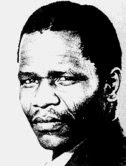 The Communist University meets on Monday, 26 May 2008, at 17h00, in the SACP boardroom, third floor, COSATU House, 1 Leyds Street, Braamfontein, to discuss the urgent statements of the ANC Secretary General, Gwede Mantashe (pictured) and the SACP General Secretary, Dr Blade Nzimande. These statements have been collected into a single document, together with the CU 2008 draft programme, for the purpose of the discussion. See the first linked item below, which must also serve for us to mark Africa Day, in the spirit of Cde Gwede’s words. Please read them.
The Communist University meets on Monday, 26 May 2008, at 17h00, in the SACP boardroom, third floor, COSATU House, 1 Leyds Street, Braamfontein, to discuss the urgent statements of the ANC Secretary General, Gwede Mantashe (pictured) and the SACP General Secretary, Dr Blade Nzimande. These statements have been collected into a single document, together with the CU 2008 draft programme, for the purpose of the discussion. See the first linked item below, which must also serve for us to mark Africa Day, in the spirit of Cde Gwede’s words. Please read them.There have been no full posts to the CU blog since 12 May 2008, until this one. One of the reasons is that this has been the time of the so-called “xenophobia” pogroms, starting in Alexandra in the home area of the CU on 11 May 2008, and at this time of writing still spreading as far away as Cape Town.
You have received some relevant direct messages via the CU list, including material about the COSATU/Civil Society marches that took place all over the country on 17 May, protesting against the xenophobia, the oppression of the Zimbabwe people, and high prices of food and electricity at home.
The CU did meet last Monday. It discussed Chapter 9 of Capital, Volume 1, on the Rate of Surplus Value. The next part of Capital, Volume 1 that we will discuss is part of Chapter 10, called “The Working Day”. See the last linked item below. In the circumstances it seems necessary to put off the discussion on Chapter 10 for a week, so that we can discuss the pogrom situation and what we can do about it.
There have been two strands of debate in the Internet. Some have said that there must be immediate practical responses to the pogroms. The others say that we must learn about the underlying causes and fix them for the long term. Fortunately, between the SACP’s statement last Wednesday, published in Umsebenzi Online, and the ANC’s statement on Friday, published online in ANC Today, our leaders Comrades Nzimande and Mantashe have between them dealt with both ends of the problem, decisively.
If comrades had implemented the agreed (at Polokwane) plan to build street committees for political purposes and for defence against crime, then the spread of the insane pogrom riots would have fizzled out quickly. In practice, not one single street committee has yet been heard of.
The second item below is our good comrade Steve Faulkner’s vivid account of the shameful events as they unfolded through Kensington and Jeppestown last weekend. This extraordinary piece of writing has whizzed around the world electronically. It is a far better description than the mass media have yet published.
The third item is Cde Minister of Arts and Culture Pallo Jordan’s outstanding defence of internationalism and denunciation of the false pretensions of Robert Mugabe and the Zanu-PF party in Zimbabwe.
The fourth item is a well-written article about the mistakes that are being repeated in the matter of housing. These mistakes have already been made many times before, and they have certainly contributed to the situation in which pogroms become possible. Marie Huchzermeyer, an academic, speculates that a combination of organised mobilisation of public opinion, together with a “significant jurisprudence”, will begin to swing the tide in housing.
The CU does not agree with Huchzermeyer’s faith in liberal middle-class initiatives. The lasting remedy in urbanism is more likely to come from politically-organised street committees, than from TAC-like donor-funded lobby structures. Such organisations have existed before in housing but they have all faded, and are hardly ever heard from any more. Huchzermeyer’s own fine initiative, the urbanist debates that are still held at Wits, were heavily infiltrated by banking interests. Such interests have re-asserted a hegemony in academia, so that the organisations of the working class and the poor are once again made to feel out of place at our state-funded University.
Click on these links:
Xenophobia is a Crime, Mantashe, plus Back to Basics, Nzimande, plus CU 2008 (3231 words)
Pogrom report from a friend and COSATU comrade, Steve Faulkner (3248 words)
Zimbabwe - Democracy is not a privilege, Z Pallo Jordan (2037 words)
Slums law based on flawed interpretation of UN goals, Huchzermeyer (1169 words)
The Working Day, Capital, C 10, parts 1 to 4, Karl Marx, 1867 (11,022 words)
Coming Events







